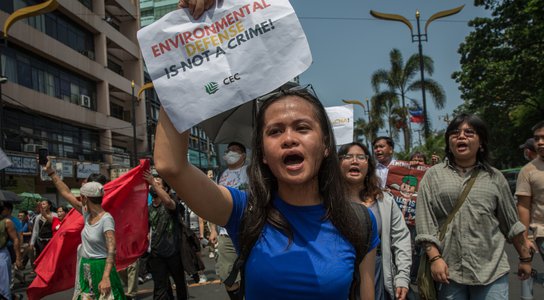The sixth UN Environment Assembly (UNEA-6) concluded last month, with the adoption of a resolution aimed at preventing environmental damage when extracting minerals required for the transition to renewable energy.
But procedural roadblocks, political
powerplays and opposition from Member States resulted in a watered-down
resolution that left many observers reflecting on it as a missed opportunity.
Here are our four takeaways from the event.
1. Member States block action to improve environmental sustainability
This is the third time the Assembly has tackled the question of mineral and metal extraction in resolutions, but the first since major policy announcements by the US and EU signaled an increasing global drive to extract more minerals for the energy transition.
Previous resolutions on “Mineral Resource Governance” and the “Environmental Aspects of Minerals and Metals Management” mandated the United Nations Environment Programme (UNEP) to determine how to improve the environmental sustainability of minerals and metals along their full life cycle.
This new resolution mandates UNEP to establish a digital knowledge hub to compile good practice on environmental protection and mitigation for mining transition minerals. This represents a proactive step towards tackling the environmental impact of mining, but overall there was very little else to cheer.
Original drafts of the text had included an assessment of regulations and voluntary standards and regulatory bodies, the establishment of a working group on best practice, and the strengthening of UNEP's mandate to work on environmental problems related to sand extraction and deep-sea mining. But countries like Indonesia, Iran, Saudi, Egypt, Argentina, Russia, Algeria, and Chile resisted fiercely, erasing them from the final text.
2. Countries dodge responsibility for environmental harms
The resolution does not commit Member States to mitigate environmental harms associated with transition mineral supply chains.
The initial draft included references to minimising the negative impacts of mining on producer countries (those with large deposits of minerals), including tackling human rights violations and addressing colonial forms of extraction, but again these were removed.
Instead the resolution merely calls for greater inclusivity of all stakeholders (from policy makers and mining companies to producer countries and local communities) in the mining life cycle and consultative processes to develop opportunities for capacity-building on the environmental aspects of minerals and metals.
This represents a missed opportunity to address the harmful impact of the extractive sector on the communities that are impacted by mining.
3. Overconsumption on the agenda, but no plans to tackle it
At the Assembly, the UNEP’s high-level expert group on resource issues, the International Resource Panel (IRP), launched research showing that wealthy countries are using a vastly disproportionate share of the world's resources – six times more materials per capita, and causing ten times more climate impacts than the world's poorest.
If we continue on this path, resource use will increase by 60% by 2060, jeopardising environmental sustainability and human well-being, the IRP warned.
There was a painful lack of proposed solutions to address overconsumption. Whilst campaign groups and activists issued calls for wealthier countries to set targets and establish initiatives to reduce overall energy usage and demand, there was little agreement on how this could be practically achieved by Member States.
4. The UN must back up its intentions with action
The UN and its Member States must be much bolder in their ambition to achieve a just energy transition.
The UN Secretary General’s Panel on Critical Energy Transition Minerals must be a vehicle for action at the upcoming climate negotiations, and next year’s UNEA.
In these forums, the UN will need to play a key role in outlining the environmental cost-benefit of extracting these materials. It will have to help to define global resource use reduction pathways and amplify efforts on circular economies. Within these parameters, Member States will need to take steps to reduce the impact of mining and work together on pathways to make mining have the least impact possible on the environment and human rights.
The next two UNFCCC COP meetings in Azerbaijan and Brazil are opportunities to tackle the issue of fair resource sharing to ensure both the value chain and the renewable technologies that are manufactured from these resources are shared equitably. COP 30 in Brazil - which under the Lula government is pledging to roll back encroachment on the land of their Indigenous people - would also be a symbolic platform for enshrining wording about free, prior and informed consent for Indigenous Peoples and communities that was missed at UNEA-6.


